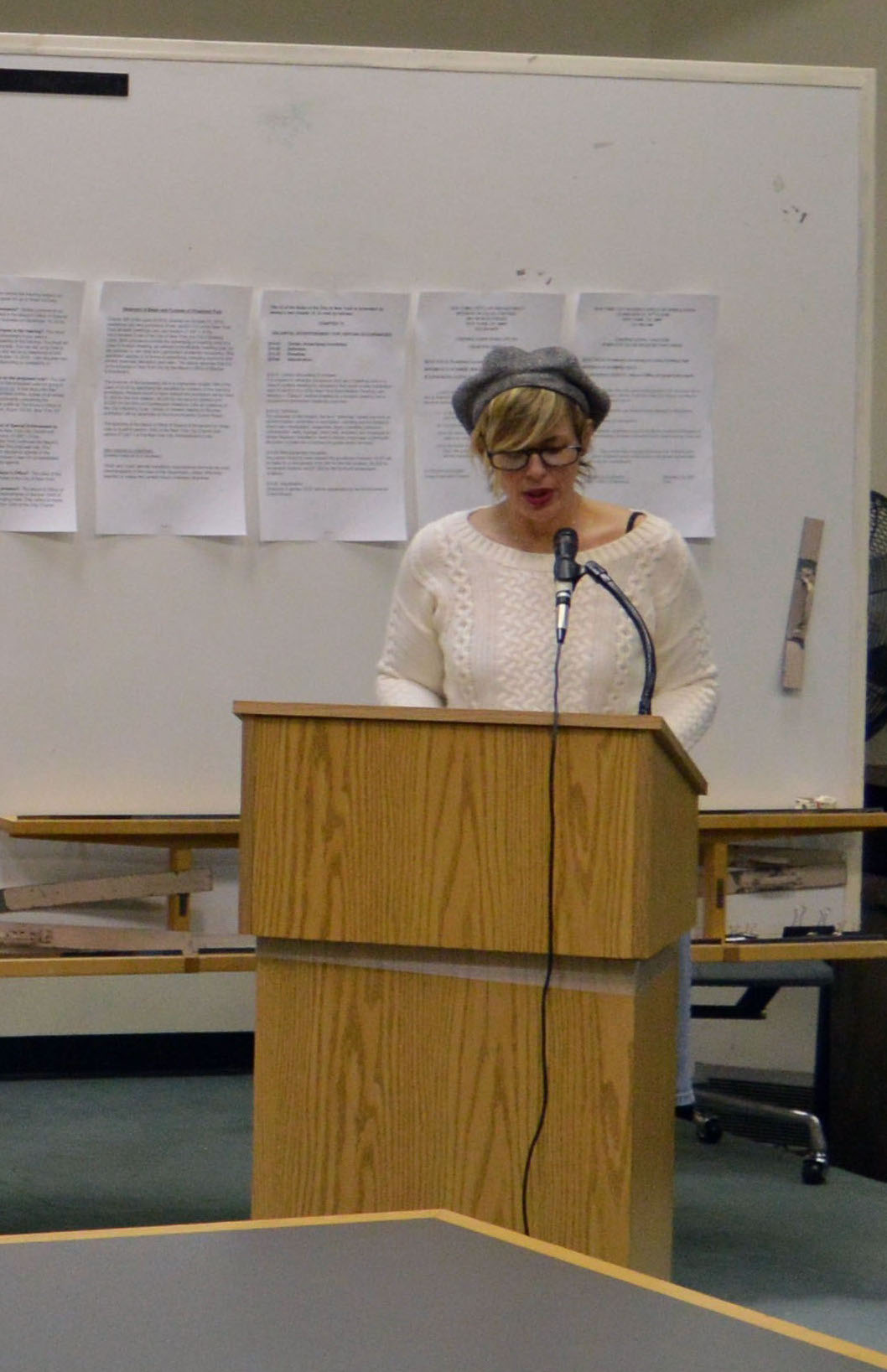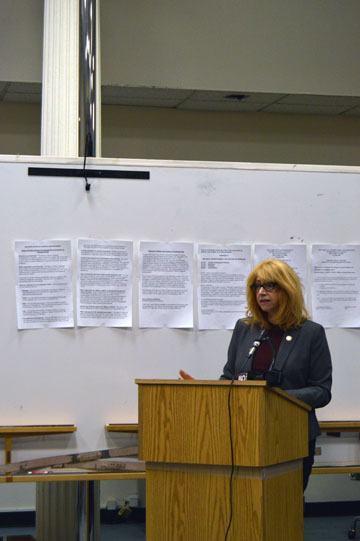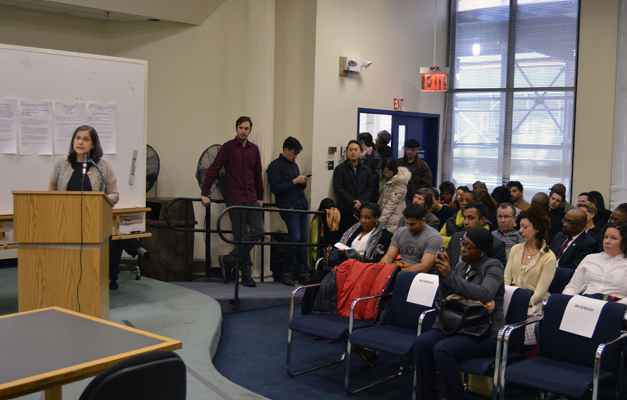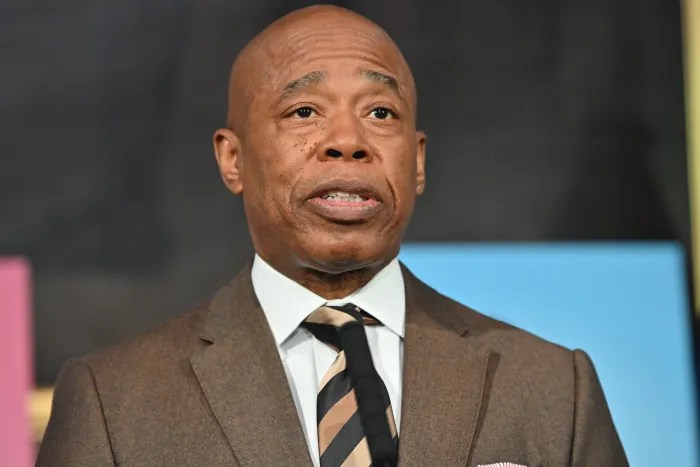
BY JACKSON CHEN | Airbnb hosts as well as groups opposed to the home-sharing company’s activities in New York came out in droves to a December 19 hearing held by the Mayor’s Office of Special Enforcement that took up the question of how a new state law prohibiting the advertising of short-term rentals of homes should be enforced.
In October, Governor Andrew Cuomo signed into law a bill, sponsored by Upper West Side Assemblymember Linda Rosenthal, that imposes fines up to $7,500 for landlords and tenants who rent out entire apartments, while they are vacant or tenants are absent, for less than 30 days.
The new law immediately sparked a lawsuit from Airbnb, but the company withdrew its suit once it was assured that enforcement efforts would target hosts who operate illegal hotels –– both landlords and individual tenants –– and not the company hosting the listings website.
Now, everyone’s attention is focused on how the Mayor’s Office of Special Enforcement (MOSE) aims to put the new restrictions into practice. A major concern is whether the city will focus on abusive landlords who warehouse vacant apartments to list on the website or will also go after individual tenants who choose, essentially, to sublet their units for shorter periods of time than allowed by law.
For many hosts using the Airbnb platform, the new law and its fines could become a threat to income they have become accustomed to making by renting out their homes.
Jeani Roth, an Upper East Sider who’s been hosting for two years through Airbnb, said she was able to overcome financial hardships stemming from health problems by renting out her apartment. With the new law threatening to slap her with fines if those rentals are for less than 30 days, Roth pleaded with MOSE to target the bad actors, not hosts of single apartments seeking extra money to get by.
“While the intent of this law may have been a good one, enforcement of the law on hosts like myself would be crippling,” Roth said. “Thousands of dollars in fines should not be directed at someone like me, but rather the illegal hotels for commercial operators with many listings.”

Dozens of other hosts from Manhattan, Brooklyn, and Queens attended the hearing to tell their stories about how renting out their homes helped them stay financially afloat.
For Yulia McClamrock, a part-time photographer on the Upper West Side, the extra money from hosting her one-bedroom apartment allowed her to return to school and continue her career.
“While the intent of this law is very positive, we should think about hosts like me,” McClamrock said. “If not for Airbnb, I wouldn’t be able to live in Manhattan… I just ask you to take the many, many stories into consideration before you slash us and don’t give us a chance to share on this amazing platform.”
While hosts related their personal anecdotes, opposition groups and elected officials emphasized the greater good of a law they say will help restore the city’s affordable housing stock and its residents’ quality of life.
“Illegal hotels represent a pernicious threat to New York’s tenants and to our affordable housing stock,” Assemblymember Rosenthal said. “Their proliferation hastens the pace of gentrification and leads to higher housing prices for all New Yorkers. It diminishes our stock of affordable housing as well as the quality of life for tenants who are forced to share their building with a rotating cast of strangers occupying apartments meant for New Yorkers.”
She added that if the city is to preserve an adequate stock of affordable housing, MOSE needs to crack down on commercial operators “who are collectively warehousing thousands of units of housing that can and should be made available to permanent New Yorkers and their families.”
City Councilmember Helen Rosenthal focused her remarks on the responsibility Airbnb has to adequately police its own website, whether or not the new law specifically holds it legally responsible for the actions of those listing there.

“If Airbnb complied with the New York State Multiple Dwelling Law, its site would not allow anyone to post an illegal rental,” the councilmember said in her testimony. “So here we are, left holding the bag with an arm and a leg tied behind our backs, trying to enforce New York State law, a law which helps preserve affordable housing.”
While they may be on opposite sides regarding the letter of the new law, both hosts and opposition groups seem to agree that its enforcement should zero in on those who skirt the housing laws for profit by listing multiple units or creating setups similar to illegal hotels. The Airbnb hosts insisted they should not be grouped in with such commercial operators and be subject to heavy fines. Elected officials, as well, emphasized the need for MOSE to focus on those who warehouse empty apartments or list multiple apartments.
Councilmember Rosenthal urged the city to launch an education campaign of advertisements, public service announcements, and comments in news stories to explain exactly what is legal or illegal when it comes to listing a home on Airbnb.
“We don’t want individual tenants to unknowingly engage in illegal acts that could result in a fine by the city and an eviction by their landlord,” she said.
First offenses for listing entire apartments on sites like Airbnb for rentals of less than 30 days will result in fines of $1,000, rising to $5,000 for the second offense, and $7,500 for third and all subsequent times.
“Now that the bill has finally become law despite threats of legal action, MOSE has the ability to wield tremendous power to curtail the lawbreaking of Airbnb and similar brazen illegal hotel operators,” Assemblymember Rosenthal said.

































